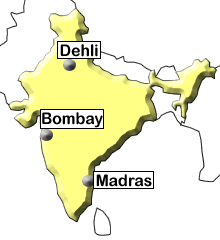India Map
Useful information, links to flags, maps, travel & city guides, hotels, accommodation, tourist information, attractions, geography, community & tourism web sites & car hire resources.
![]() Full
Name: Republic of India. Capital City:
New Delhi. Area: 3,287,590 sq km, 1,269,338
sq miles. Time Zone: GMT +5.5. Languages:
Hindi, Urdu, Tamil, Bengali, Kashmiri, Kannada, Marathi, Gujarati, Telugu,
English (essential). Religion: 82% Hindu, 12%
Muslim, 2.3% Christian, 1.9% Sikh, 0.8% Buddhist, 0.5% Jains, 0.5% other.
Currency: Indian Rupee (Rs). Country
Dialing Code: 91.
Full
Name: Republic of India. Capital City:
New Delhi. Area: 3,287,590 sq km, 1,269,338
sq miles. Time Zone: GMT +5.5. Languages:
Hindi, Urdu, Tamil, Bengali, Kashmiri, Kannada, Marathi, Gujarati, Telugu,
English (essential). Religion: 82% Hindu, 12%
Muslim, 2.3% Christian, 1.9% Sikh, 0.8% Buddhist, 0.5% Jains, 0.5% other.
Currency: Indian Rupee (Rs). Country
Dialing Code: 91.
 |
Other towns >> |
Dravidian people created the traditional Indian culture along with Aryan tribes who came to the Indian subcontinent from the Northwest around 1500 B.C. The Maurya Empire of the 4th and 3rd centuries B.C. united much of the region under the leadership of Ashoka.
The Gupta Dynasty (4th - 6th century A.D.) was known as the Golden Age, when Indian art, science and culture flourished. Arab peoples started to arrive around the 8th century, followed by European traders in the 15th century.
The British Empire gained political control of most Indian territories by the 19th century, governing with several hundred civil servants (administrators) and the support of Indians who served in the British army until World War 2. Gandhi led non-violent resistance to British rule, and Nehru brought independence in 1947. The sub-continent was divided into India, a secular state, and Pakistan, a Muslim state.
War between India and Pakistan in 1971 resulted in East Pakistan becoming the independent state of Bangladesh. Disputes between India and Pakistan over the Kashmir border area lessened since 2002 when diplomatic efforts were accelerated. India is now one of the fastest growing nations in the modern economic world.
Hindi is the national language and is spoken by around 30% of the people. English is widely spoken and is a main language for administration and commerce.
Officially there are 21 other languages. Alphabetically these are Assamese, Bengali, Bodo, Dogri, Gujarati, Kannada, Kashmiri, Konkani, Maithili, Malayalam, Manipuri, Marathi, Nepali, Oriya, Punjabi, Sanscrit, Santhali, Sindhi, Tamil, Telugu, and Urdu.
Hindustani is a variant of Hindi & Urdu. Whilst not one of the official languages, it is spoken widely across northern India.
Monsoon Seasons in India - North-eastern monsoons occur from December to early March. South-western summer monsoons take place from June to September. Care should be taken when travelling in rural areas In India during the monsoon seasons. Monsoon rains cause flooding and landslides that can cut off some towns and villages for several days. Check access and exit routes before setting off on a journey.
Cars and Driving in India - Tourists and visitors should take care when travelling in India. One of the biggest causes of injury is car and bicycle accidents.
Boat and Sea Travel in India - Tourist boats rarely carry life saving equipment, and piracy has occurred in and around India’s waters. There is a lack of warning signs or flags and life-saving equipment on most of India's beaches. Strong currents are particularly hazardous as India is surrounded by one of the world’s major oceans.
Train Travel in India - Travellers have reported being drugged and robbed on trains, therefore it is unwise to accept food from strangers. Particular care should be taken of passports and valuables when using the trains. In particular avoid individuals offering tours and tickets at railway stations.
International Flights from India - Flights out of India become very full from December to April. Confirm all international departures at least 72 hours before departure.
Travel Health in India - Seek medical advice before travelling to India and ensure that all appropriate vaccinations are up-to-date. Mosquito-borne diseases such as malaria and dengue affect most of the country. Local medical facilities are not like those in western economies, especially in remoter areas of India. The major cities have private medical care, but it tends to be expensive. Comprehensive travel and medical insurance should be taken out before leaving home. Check exclusions in the policy, and ensure cover for all activities you might want to undertake.
Passports on travel to India should be valid for at least six months. Arrival in India without a valid visa will result in refused entry. The visa must be obtained before travel to India.
Recommend a link | Terms of use | Link to us | Contact © RDC Ltd. 2008
